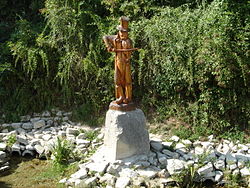Chrząszcz
Chrząszcz (beetle, chafer) by Jan Brzechwa is a tongue-twister poem famous for being considered one of the hardest-to-pronounce texts in Polish literature. It may cause problems even for adult, native Polish speakers.[1][2][3]
The first few lines of the poem:
| Phonetic transcription | English translation | |
|---|---|---|
| W Szczebrzeszynie chrząszcz brzmi w trzcinie | [f‿ʂt͡ʂɛ.bʐɛ.ˈʂɨ.ɲɛ xʂɔɰ̃ʂt͡ʂ bʐmi f‿ˈtʂt͡ɕi.ɲɛ] | In Szczebrzeszyn a beetle buzzes in the reeds |
| I Szczebrzeszyn z tego słynie. | [i ʂt͡ʂɛ.ˈbʐɛ.ʂɨn s‿ˈtɛ.ɡɔ ˈswɨ.ɲɛ ‖] | And Szczebrzeszyn is famous for this. |
| Wół go pyta: „Panie chrząszczu, | [vuw ɡɔ ˈpɨ.ta | ˈpa.ɲɛ ˈxʂɔɰ̃ʂ.t͡ʂu |] | An ox asks him: "Mister beetle, |
| Po cóż pan tak brzęczy w gąszczu?" | [pɔ t͡suʂ pan tag‿ˈbʐɛn.t͡ʂɨ v‿ˈɡɔɰ̃ʂ.t͡ʂu ‖] | What are you buzzing in the bushes for?" |

The first line "W Szczebrzeszynie chrząszcz brzmi w trzcinie" (In Szczebrzeszyn a beetle buzzes in the reed) is a well-known Polish tongue-twister and dates to at least the 19th century.[2]
Thanks to the poem, the town of Szczebrzeszyn is widely known in Poland. Two monuments to the beetle were erected there, and a yearly sculpture festival has been held there ever since.[citation needed]
Chrząszcz was translated into English by Walter Whipple as Cricket (whose Polish equivalent, świerszcz, is also considered difficult to pronounce for non-Polish speakers).
See also
[edit]References
[edit]- ^ Kwapisz, Jan; Petrain, David; Szymanski, Mikolaj (2012-12-06). The Muse at Play: Riddles and Wordplay in Greek and Latin Poetry. Walter de Gruyter. p. 1. ISBN 978-3-11-027061-7.
- ^ a b Niesporek-Szamburska, Bernadeta (2010). "Zabawy brzmieniem we współczesnych wierszach dziecięcych". Język Artystyczny (in Polish) (14): 141–156. ISSN 0209-3731.
- ^ 10 Craziest Polish Tongue Twisters
External links
[edit]- ""Chrząszcz brzmi w trzcinie" - J. Tuwim, W. Literackie, 1933". Retropress (in Polish). 2016-05-26. Archived from the original on 2022-10-30. Retrieved 2023-04-18.
{{cite web}}: CS1 maint: unfit URL (link)
